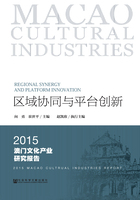
Preface Three Innovation Driving Force·Regional Synergy
Xiang Yong[1]
China’s development has reached a new normal,where traditional growth models,seen as unsustainable,are being discarded,and the country has instead begun to look for new forces for growth and ways to upgrade its industrial structure.
Today,the new driving force for growth is innovation,which includes technological and cultural innovations,as well as the synthesis of the two. Since 1998,China began mapping out a national strategy for developing cultural industries,which includes improving cultural productivity through systemic reforms;integrating the development of culture industries,creative industries,and design services;and,finally,achieving the symbiosis between “industrialization of culture” and “culturalization of industries”. These efforts eventually paid off:by 2013,cultural industries contributed 210 million yuan to the Chinese economy,3.63% of GDP. In numerous Eastern cities,cultural industries became pillar industries. Today,cultural and creative resources has become a sustainable,indigenous source of economic growth.
As a place where Chinese and Western cultures meet,Macao boasts a unique history and cultural heritage,as well as a generous political environment under the “one country,two systems” rule. But in the recent past,the region has undergone several changes to its industrial structure,from the predominance of transit trade,to export processing,to gambling.
In truth,Macao from the start could never establish strong industrial sectors:primary industries were weak for geographic reasons. Secondary industries such as manufacturing,on the other hand,declined gradually. Tertiary industry such as tourism,gambling,and other services,however,saw rapid growth. Among the tertiary industries,gambling gradually became the dominant industry.
However,this imbalance among industries leaves Macao at the mercy of external factors,breeding instability and creating a domino effect on the industrial supply chain. As such,Macao has begun pushing for much-needed diversification of local industries. In order to push for greater diversification,however,it would need to slow down the development of the gambling industry. This would have to be done while still trying to maintain economic stability in the region.
I believe that although there are various models of diversification,supporting the culture industries,which by nature are about innovation,value-creation,and product-development,is a crucial strategy for boosting the existing sectors and diversifying Macao’s industrial structure. As a UNESCO World Heritage site,Macao is a strong base for culture industries,and would create sustainable opportunities when combined with other sectors.
In the 21st century,the development of the cultural industries in Macao has gone through three phases.In the first phase,between 2000 and 2009,the Macao S.A.R. government and the community organized forums,conducted research and published papers,campaigns were made to raise public awareness on the importance of developing the cultural industries.
The second phase,between 2010 and 2013,was a period of policy preparation in which the Macao SAR government set up the Department for the Promotion of Cultural and Creative Industries,the Cultural Industries Committee,and the Cultural Industries Fund.
The third and final phase was the industrial take-off period in 2014,when development plans were gradually implemented. During this period,the first batch of funds for cultural industries was made available to the public,in effect incentivizing the development of local cultural entrepreneurs in Macao.A period of rapid development is now expected to follow. However,in order to develop Macao into a full-fledged international recreation center and a creative hub,it will require the efforts and contributions of larger corporations.
Although Macao has now come a long way,the reality is that it has still a long road ahead in terms of development and finding sustainability. Because Macao’s cultural industries developed much later than those in mainland Chinese cities,it has yet to discover a full working development model for the region. To reach this goal,more work needs to be done in the following areas:
First,attitudes toward culture need to change. Insofar as cultural understandings and cultural industries are concerned,it is important not only to understand their differences but also to see the need to promote their integrated development.
Second,a suitable development model should be identified. Macao should learn from the experience of developed countries and regions,such as South Korea and the United Kingdom. Contributions by experts and scholars from the South Korean government are included in this volume.
Third,statistical indices need to be clarified. We urgently need to develop a system of statistical indicators for gauging Macao’s cultural industries and publish this information each year. This feedback is necessary for ensuring that the development of cultural industries is going in the right direction.
Fourth,more needs to be done to cultivate local talent. Implementation of talent recruitment and incentive programs at all levels is crucial.
Fifth,the culture market needs to grow.It is necessary not only to provide good services for both Macao residents and foreign visitors,but also to actively develop an integrated market for the Pearl River Deltaregion and the already thriving mainland Chinese and international markets.
In sum,developing the cultural industries involves resources,technology,talent,financing,markets and enterprise. Macao should be able to adjust and make needed improvement in all these areas in response to changes in the real world and to the developments in the cultural industries. This is the only way that they will develop a progressive and sustainable cultural industry that is distinctly Macao and absolutely world-class.
The Forum on Cultural Industries (Macao) 2015,was attended by experts and scholars from UNCTAD,the United Kingdom,Spain,South Korea,mainland China,Taiwan and Macao. They shared their experience in regional collaboration and platform innovation,the theme of the forum,and had heated and in-depth discussions about Macao’s uniqueness,contributing their share to the future development of Macao’s cultural industries.
[1] Xiang Yong,Professor,School of Arts,Peking University,Vice Dean of Institute for Cultural Industries,Peking University.